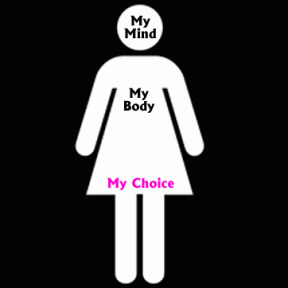Abortion: Woman's Right?

A woman’s right to get an abortion is a controversial moral issue we all hear about on a regular basis but one rarely stops to think about who exactly is involved in or affected by this process, and who has the authority to decide if it is indeed morally acceptable. ‘Morality’ shall be defined as that which is in accordance with principles or rules of right or good conduct measured against prevailing standards of rectitude. But before considering whether abortion is right or wrong, one must first consider all the factors and reasons why one seeks out abortion.
Everyone has different circumstances and failing to appreciate the mother’s perspective, and why exactly she might want an abortion is a major oversight. Some women get ill during pregnancy, others cannot continue their job or education, do not have the means to provide for children, have chronic diseases, etc. Frequently, victims of rape or incest choose to abort and this is understandable.
Basically, a pregnant woman is in the best position to judge whether an abortion is the appropriate response to her circumstances.This is not to say that abortion is necessarily moral in all circumstances subject to the mother’s concern but in most cases it should ultimately be she who decides what is best for her situation. In a case where bringing the baby to term is life threatening to the mother, one must surely consider the mother’s rights to abortion. Philosopher Judith Jarvis Thomson illustrates this using multiple creative examples. Of particular interest is her analogy of the small child in a house with you that is rapidly growing. If you do not kill it, then eventually it will crush you to death. Must you let it continue to grow? Or do you have the right to kill it if it means saving your own life? Jarvis suggests that although both parties are innocent, you do have the right to save your own life. “A woman surely can defend her life against the threat to it posed by the unborn child, even if doing so involves its death.” The most convincing and obvious argument why the mother is and should be the fundamental concern with regards to abortion is that it is dealing with her own body. If we do not include her in the debate, we are missing the main facet of pregnancy altogether. A central moral feature of pregnancy is that it takes place in women’s bodies and has profound effects on women’s lives.
Although it is certainly necessary to focus mainly on the mother, there is an extent to which the mother can be the sole focus. There are definitely other factors that entail consideration. Bearing in mind that we are dealing with a potential life, we must not overlook the fetus in question. It is important to note however, that there is much debate over when a fetus actually becomes a person which makes it difficult to include. Philosopher John T. Noonan, in his article “An Almost Absolute Value in History”, attempts to explain how we determine the humanity of a being. Noonan specifies many different criterions which one might associate with being successfully labelled human. Christian theology states that you are human if you are conceived by human parents. This theory coincides with the medieval theory of ensoulment, in which the soul enters the body at conception. In this case, one would be considered killing a person if he were to abort a fetus. But there are other distinctions, namely one in terms of experience. “Humanity depends on formation by experience. The fetus in ‘unformed’ in the most basic human sense.” Either way, the fetus still deserves some sort of moral inclusion, as it does have the potential to be a thriving human being. But, even granted that the fetus is a human being, and therefore has a right to life, the right to life consists not in the right not to be killed, but rather in the right not to be killed unjustly.
This brings us back to how we can determine if aborting the fetus is killing it unjustly. When we raised the reasons for abortion, we mentioned various circumstances under which a woman might choose to abort her pregnancy. There are also instances, though, in which it is unjust to abort a fetus. Thus we cannot just focus on the mother’s wants and needs. For example, if a woman wants to abort her pregnancy because it will be an inconvenience, that is simply unjust. And yet, it is still important that the ultimate decision of “to abort or not to abort” lies in the mother’s hands.
All in all, though the fetus is important, it does not have the most viable argument attached to it. That is not to say that it is acceptable to focus exclusively on the mother, with no reference to the fetus at all, but it should be the most important and central part of the argument. It is every person’s right to decide what happens with his or her body. The debate over the moral status of abortion cannot be resolved, simply because each individual has their own ideas of what is considered moral according to their personal views. However, if there is greater focus on the mother as an individual moral agent, there would be a greater understanding of why abortion should be permissible.


![The Fallout From the Conservative Assault on the Right to Privacy and the Supreme Court's Lurch back to 1820 [Updated] The Fallout From the Conservative Assault on the Right to Privacy and the Supreme Court's Lurch back to 1820 [Updated]](https://images.saymedia-content.com/.image/t_share/MTkxMTU1MjUyMDYwMjM1NTM5/the-fallout-from-the-conservative-assault-on-the-right-to-privacy-and-the-supreme-courts-lurch-back-to-1820.jpg)





